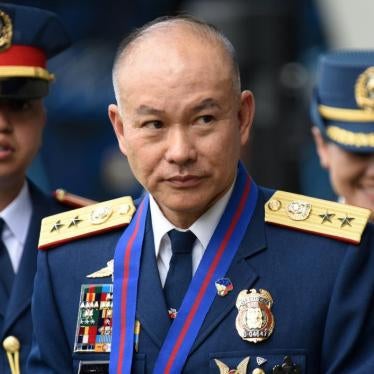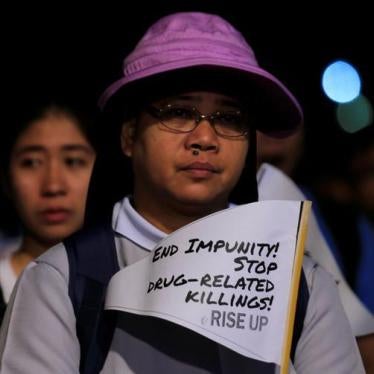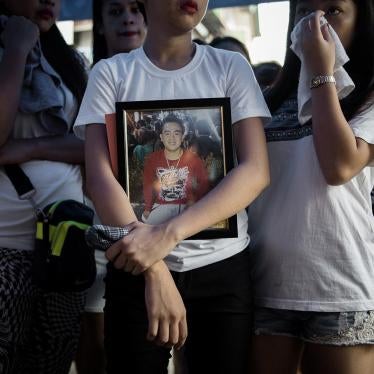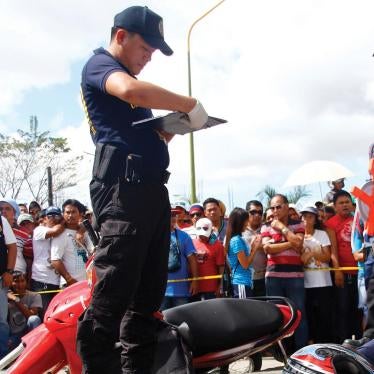Dear Director General Albayalde,
Congratulations on your recent appointment as chief of the Philippine National Police (PNP).
Human Rights Watch is an independent, nongovernmental organization that investigates and reports on violations of international human rights and humanitarian law by governments and non-state armed groups in more than 90 countries around the world.
Since the late 1980s, Human Rights Watch has worked on human rights issues in the Philippines and provided input to the Philippine government. With your appointment, you have an opportunity—and the responsibility—to address continuing human rights concerns in the country. As the Philippines is a party to the major international human rights treaties, we urge you to ensure that the PNP meets the Philippines’ international legal obligations.
You have publicly stated that human rights play a crucial role in the government’s anti-drug campaign and is committed to observing the rule of law. However, we note that the so-called war on drugs, in which the PNP’s own records found more than 4,000 people to have been killed, has been a major human rights catastrophe.
We urge you to take all necessary and appropriate action to prevent abuses by PNP personnel; to ensure prompt, transparent, and impartial investigations of alleged rights abuses in which PNP personnel were implicated; and to take appropriate action to ensure that personnel who commit abuses are appropriately held to account.
The following human rights issues should be a priority for the PNP under your leadership:
“Drug War” Killings
Philippine President Rodrigo Duterte’s “drug war” has resulted in the deaths of more than 12,000 men, women, and children by police and police-backed vigilantes since it began nearly two years ago. Research by Human Rights Watch as well as the United Nations, the media, and other nongovernmental organizations found that many of the killings were summary executions in which police or their agents planted weapons and drugs on bodies and then claimed the victims had “fought back.” No one has been held to account for these killings.
The government’s own #RealNumbersPH puts the death toll in police operations at 4,279 from July 1, 2016 to May 15, 2018. While appearing as a guest on the show “The Chiefs” on One News, you asserted that 608 cases have been filed against police officers for deaths related to the “drug war,” suggesting that these officers are either in custody or suspended from service. However, the Internal Affairs Service of the PNP reported instead that the 608 cases are merely “pending cases” for “summary hearing procedure.” It is not clear to what extent the PNP has taken action in any of these cases.
Moreover, by the government’s own documentation, the 2017 accomplishment report of the Presidential Communications Office, there have been more than 16,000 killings—what the government calls “homicide under investigation”—related to the “war on drugs” that were committed by unidentified assailants from July 2016 through December 2017. Human Rights Watch’s own monitoring indicates that killings by unidentified gunmen of drug suspects continue daily, in addition to killings by police during anti-drug operations.
We urge you to make public on a regular basis specific information on the 608 cases and any future cases filed against police officers for alleged misconduct in the anti-drug campaign, including the status of the cases and the specific action being taken against police officers facing criminal and administrative action.
We also urge you to ensure that the thousands of killings by unidentified assailants be thoroughly and impartially investigated and to provide the public updates on the status of these cases.
“Death Squad” Killings
A recent report by Rappler said that an average of four people are killed each day by riding-in-tandem shooters, and that since October 11, 2017, a total of 880 people have been shot dead and 47 injured. The report noted that the attacks were committed by a total of 1,071 suspects, the vast majority of whom—1,008—remain at large.
These findings are consistent with Human Rights Watch monitoring and research. So-called riding in tandem executions bear strong similarities with the modus operandi and victim profile of the Davao Death Squad, the Tagum Death Squad, and other assassination groups. Their victims include street children, suspected drug dealers, petty criminals, businessmen, and local politicians.
A May 2014 report on summary killings in Tagum City identified specific police officers assigned to the Tagum City Police Office with complicity in the operation and control of the so-called Tagum Death Squad. To our knowledge, the PNP has not initiated an investigation and prosecution of officers allegedly involved in unlawful killings there.
We urge you to undertake a thorough and transparent investigation of police complicity in the country’s “death squads.” It is critical that you publicly disavow the use of death squads as a legitimate crime-control strategy and especially police involvement in them. We urge you to make public PNP findings on specific “riding in tandem” cases it has investigated, and the actions taken.
A key test of your and the PNP’s commitment to protecting the human rights of all Filipinos is to be as transparent as possible with the public about the steps and efforts that your office takes to address these issues, even when police are involved in wrongdoing. This also means cooperation with such institutions as the Commission on Human Rights both at the national and local levels, the media, and civil society organizations. We urge you to publicly direct all police officials to cooperate fully with these entities.
Thank you for your consideration. We would appreciate the opportunity to discuss these and other human rights issues with you at your convenience.
Sincerely,
Brad Adams
Asia Director
Human Rights Watch








